In an era of Bushes and Kennedys, will Maryland have a political dynasty, too?
Father’s Day Conversations with Maryland’s retiring Senator Paul Sarbanes and his son John, himself a candidate for Congress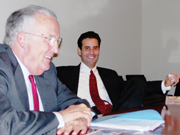
a Bay Weekly interview by Sandra Olivetti Martin
In 1976, America celebrated its bicentennial. Jimmy Carter was elected president. A gallon of gas cost 68 cents. And people wore their pants low at the hip and wide at the ankle. If you’re a Marylander born since that year, Paul Sarbanes has been your senator your whole lifetime.
Yet Maryland’s quiet, senior senator is a stranger to many.
Retiring this year, when immigration is a political strategy polarizing the country, Sarbanes lived the immigrants’ dream.
The son of Greek immigrant restaurateurs, he grew up a smart, hardworking athlete in Salisbury, won a scholarship to Princeton, became a Rhodes scholar and earned his law degree at Harvard. Meanwhile, he married an English girl who happened to teach Greek, and together they raised three children.
Before his 33rd birthday, Paul Spyros Sarbanes was elected to represent Baltimore in the Maryland General Assembly. Four years later, he won a congressional seat, and six years after that captured the Senate seat that he holds to this day.
There he has earned a reputation as a statesman and deep thinker who, as a leader on the Senate Banking, Housing, and Urban Affairs Committee, helped sweep out the nation’s financial markets after the Enron scandal.
Now, his announced retirement after 30 years has set Maryland politics revolving in a high-stakes political game of musical chairs. Contenders for his seat have given up their own seats.
One result in this era of political dynasties is that John Paul Sarbanes, the eldest of the three Sarbanes children, is campaigning to take over his father’s old job as congressman from Maryland’s Third District. Anne Arundel County makes up about 30 percent of that district.
The 44-year-old lawyer has already followed in his father’s footsteps to Princeton and Harvard. To go to Congress, he’ll first have to parlay his name recognition to outpol six other Democratic contenders.
As the music in this fateful political year grows louder, Bay Weekly editor Sandra Martin caught up with Senator Paul and candidate John on Capitol Hill.
Bay Weekly Senator, is there a time that symbolizes for you the impact you feel you’ve had in 36 years in Congress?
Paul Sarbanes As a second-term member of the House, newly reelected, I was involved in a momentous historic proceeding: the impeachment of the president, Richard Nixon. I had the heavy responsibility of offering the first article of impeachment in committee.
Bay Weekly Politics has its stage families. Have the two of you spent much time together? Have you had a close father-son relationship?
Paul Sarbanes I certainly think so.
John Sarbanes It’s important that you do share some interests. We’ve had — myself, my brother and sister — that interest in public affairs and in community. If you look at what all of us have done, you can see that we were influenced by our father’s career and mother’s activities. We both come to it naturally and have that common foundation of interest and engagement in the community.
Bay Weekly What do your brother and sister do?
John Sarbanes My brother heads a 65-year-old citizen planning and housing association in Baltimore. My sister Janet, a creative writer, teaches at the California Institute of Art on the West Coast.
Bay Weekly What is your earliest recollection of your father in politics?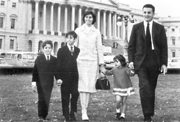
John Sarbanes Two memories. One walking in parades when I was about 36 inches high. The other, going to political rallies, particularly the ones at the end of a campaign, when I’d see him getting the most revved up, very excited and committed and engaged as time ticked down to election day.
Bay Weekly Did you ever wonder — and perhaps resent — why he wasn’t at home much?
John Sarbanes I was four years old when he entered politics, so that public space that we as family operated in was created by the time I was conscious. So we came to it naturally, my brother and sister and I, and it was not jarring in any way. Of course there were times we missed not having him there.
My law school brought back a number of graduates, including my father, to talk about their careers in politics. He made the point that you only have a limited amount of private time, my parents chose to spend that time with family, and in that respect I don’t think we missed him too much.
One of the bonuses of being from Maryland is being close to D.C. So even if you get home late, you get home.
Paul Sarbanes I have always commuted to Washington from Baltimore.
Bay Weekly At what age did you realize the significance of the work that kept your father away?
John Sarbanes Interestingly, at the same point in time he mentioned — around the Watergate era — I was 11 or so, but old enough to be conscious of what was going on and to have some sense of the important role he was playing. Ever since, I’ve had a keen sense of the important contribution he’s made — even if others don’t routinely. It takes a Sarbanes-Oxley bill to show what we understood all along.
Bay Weekly Did the children help win elections and voters’ hearts?
John Sarbanes He wouldn’t have won without us.
Paul Sarbanes The children and their mother, too. But I don’t know how much they liked parades. Their experience was riding in an open car and waving at people.
John Sarbanes I’m doing parades now as the weather warms up. I like walking and being able to shake people’s hands. I like being out and doing a campaign. If you grow up in a political environment, you can react against it or have some affinity. I think I have that affinity, and now I have an opportunity.
Bay Weekly Can you remember the moment you said, This job’s for me?
John Sarbanes Politics has been out there in the back of my mind. How could it not be growing up in it? But I wanted very much to prove myself in my own career.
But because I did have an affinity for politics, I said, if a good opportunity opens up, I ought to give it a hard look. That’s what happened here when Ben Cardin decided to run for the Senate. The Third is my district.
I thought, Let me step back and see if this is my opportunity.
Bay Weekly Have you made peace with the long hours and sacrifices it takes to rise in the political world?
John Sarbanes I think I have. I understand that my children — 15, 12 and eight — are all at important stages of life. They’re all important, you discover, as they get older. So that’s something one always puts into the analysis.
It does matter a great deal to me that Washington is close to Maryland. I don’t know that I’d pursue Congress if I was coming from Ohio, because I want to be able to be home at the end of the day and keep some stability there with family.
I’m at peace with the demands of both the campaign and, if one is successful, the job.
Bay Weekly You’ve followed in your father’s footsteps, with much of his name, his college, his law school, his number of children. Now you’re running for his former Congressional District. Isn’t it precocious to think you can make that leap without the stepping stones of state office?
John Sarbanes What I’m hearing matters to voters is not necessarily having served in elected office before but having gotten experience that will make a difference in this job.
One of the things I’m very proud of is that my experience is very diverse. I’ve been involved in the private sector in my law practice. In the public sector, I’ve served with the Maryland State Department of Education for eight years — focusing on school reform in Baltimore City and around the state — while still practicing law. In the nonprofit sector, I’ve volunteered thousands of hours to the Public Justice Center.
I’m very attracted to that form of problem-solving that looks to all quarters and promotes cooperation. I’ve done that; I’ve tried to build bridges. That’s exactly the kind of experience and perspective a lot of voters are looking for. We’ve got major challenges, and we’ve got to come together in a way that allows us to take them on and make meaningful change.
Bay Weekly What do you think you can do to cut through this crowded field of seven?
John Sarbanes That message of nearly two decades of experience in various sectors is very resonant with voters. People who know only the Sarbanes name and that I’ve not held elected office may start out from that point of view. But once I present my qualifications, they feel very comfortable.
Bay Weekly Are you having any problems with name recognition?
John Sarbanes (Laugh.) That’s not at the top of the list of problems.
I’m proud of my name. There’s a tremendous positive identification with the name and the legacy of my father. My challenge is to come in and fortify my own credentials.
Bay Weekly Senator, did you have qualms about your son’s going into this profession, in terms of its cost to personal and family life — or the harshness of the political environment?
Paul Sarbanes I thought that was a judgment he’d be able to make for himself as he’d lived through it since he was very young.
Bay Weekly Is today’s political environment really harsher, more brutally partisan than the world you entered back in 1966? There’s a legendary statue of Illinois’ Everett Dirksen, who served in the Senate from 1951 to 1969, on the lawn of the Illinois Capitol in Springfield. Behind the senator’s back, an elephant and donkey clasp hands. Is that kind of nonpartisanship only legendary?
Paul Sarbanes I think it is more difficult than when I first entered politics — though it’s not as if we haven’t had difficult times. Back over American history there’s been ebb and flow in this regard. Over my time, the climate has gotten harsher because more people are prepared to win at any cost regardless of how it’s done. If it’s not done the right way, you undercut the process and help feed public cynicism. That concerns me greatly because I want people to have confidence in their government. Democracy depends on the support of the people.
I’ve worked closely with Republicans, Sen. Charles Mathias for example, and we remain good friends. I’ve tried in my leadership of the Maryland delegation in Congress to dampen down extreme partisan sentiment with some success, and the delegation works together very well.
But [at the national level], an attack element polarizes the other side, exemplified by [former Deputy White House Chief of Staff Karl] Rove and [former House Majority Leader Tom] DeLay.
Bay Weekly How do you manage this polarizing political life so that you have time for family?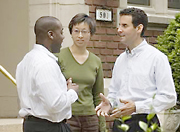
Paul Sarbanes Workdays are long here. Then at home in the evenings, you’re going to events because people want you to come. It’s not as if your constituents were back in Arizona.
I think by trying to allocate your time. Christine and I never did a lot of getting together with friends to go out for dinner and an evening. We never had enough time to do that, though we have a lot of friends and feel very close to them. Particularly when the children were younger, open evenings were spent with the children.
My wife has been very interested in public life as well, and it makes a big difference that she participated in many of these things, so we were able to do them together.
You have to plan your time very carefully and have a high energy level to be engaged in this kind of life, for the demands on your time are very great.
I believe, like Thomas Edison, that naps make a great difference. Edison took those 40-second naps. He’d sit gripping a ball bearing in his hand; when the bearing fell to the floor, it would wake him.
I can’t handle it on 40 seconds. I have to have a real nap. It refreshes me and keeps me going.
Bay Weekly Do you consult with your father on political decisions?
John Sarbanes In terms of big-picture kinds of questions, whether one strategy makes sense, I will sometimes go to him to use him as a frame of reference as opposed to day in and day out tactical advice.
I would be silly not to take some advantage of his experience.
Bay Weekly What’s the advice you give your son on winning elections?
John Sarbanes Don’t lose.
Paul Sarbanes He’s pretty good at it. I’m impressed at how he’s going about it, his focus, his strong commitment. He’s his own person. He has his own mind, and he’s putting together his own strategy. I’m not right in the midst of it, and I think that’s the way it should be. But I’m watching, and I nod my head as he proceeds.
Bay Weekly Virtually every candidate for statewide and federal office over the last 10 years has talked about commitment to Chesapeake Bay. We’ve seen your five-point plan, and there’s nothing there we haven’t heard before. Do you have any real hope of being able, as a freshman member of Congress, to stem the Bay’s decline?
John Sarbanes I think it comes back to the point about being a voice.
I’m very excited about the opportunity to take a leadership role on the Bay — not in the sense of immediately becoming a leader in Congress, because I understand that’s not how it works — but in being a leader on what affects the Bay. I’m very keen on the way we’re going to save the Bay, education in particular. In the next generation, you have to create habits to help the Bay and change behavior.
Weeks of the summer were spent with my grandmother [on the Eastern Shore], and we’d go crabbing on the Nanticoke and other tributaries.
I’ve encouraged [interest in the Bay] on the part of my children, and they’re leading me forward — which is the way it ought to be.
My daughter Stephanie is the eldest, followed by Nico, who is 12, and Leo, who is eight.
The boys in particular are committed birders of the first order. As a result of their interest, we’re members of the Chesapeake Bay Audubon Society, the National Audubon Society and the Cornell Ornithological Laboratory.
Not too long ago, they had us go down to the Eastern Shore to participate in the saw-whet owl project, and we’re out in the middle of the night trying to catch owls. As any family knows, kids drive a lot of what you do with your leisure, so that has helped us be more involved with environmental issues.
Bay Weekly Senator, now that you’re about out of the Senate, people are starting to talk about your legacy. What things wouldn’t you want omitted when your legacy is written?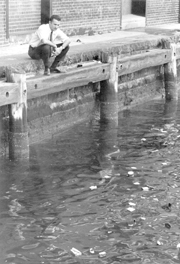
Paul Sarbanes The Sarbanes Oxley Act of 2002 has, I hope, a major impact, raising standards in the business world and helping to protect investors by ensuring they’re given information they can rely on.
I played some part in lifting the federal budget out of deficit and into surplus in the Clinton years.
And I’ve concentrated a lot on Maryland and Bay issues. If a state could have a soul, Maryland’s would be the Chesapeake Bay.
We haven’t had time to be crabbers, so I’ve devoted a lot of attention and instituted a number of programs to help keep pace with the tremendous pressure of population, which has increased from eight to 16 million over last the 30 years.
On rebuilding Poplar Island, for example, I had to go right to the Clinton White House because it required extra money, but from that project, we have a double win: The shipping channel is dredged [to help] Baltimore remain a great port of the country; and that dredged material is used to rebuild wildlife habitat.
This year I’m excited about the Captain John Smith Water Trail bill, which reported favorably out of committee just as the 400th anniversary is coming up. It will not only be very enjoyable to follow his path; the other thing is that it will attract attention to the Bay, and hopefully that additional attention will make people more sensitive to its needs.
Every survey has shown that if people experience the Bay, they’re much more protective. That’s why the many programs for schools are so important.
Bay Weekly What’s a pleasure you’ll be letting go when you leave your job?
Paul Sarbanes I derive a lot of satisfaction from seeing projects we’re working on in state come to fruition. In Western Maryland, we’ve been working a long time on rewatering the terminus of the C&O Canal in Cumberland, and we’re not entirely finished. We want to get canal boats pulled along a towpath so people can experience it for themselves. It’s going to make Cumberland a destination for tourism and make a tremendous difference in the life and economy of that city. Something like that is very satisfying.
You can go around the state and pick project after project, and that’s very satisfying. As it is with public policy when you feel you’ve made a difference and made life better.
If people are leading better lives, that is very uplifting to me.
It means a lot to me in terms of my own satisfaction to live in a just and equitable society, and I cannot disassociate myself from the well-being of society. If society is not doing well — and that’s the situation right now — that’s upsetting to me.
Bay Weekly You’ve certainly paid your dues, but were you concerned in your retirement decision about giving a senatorial seat away to the Republicans?
Paul Sarbanes I didn’t and I don’t think that will happen — and I will work very hard to try to keep it from happening.
Bay Weekly After the Washington County Jefferson-Jackson dinner, you were quoted as saying “This is a radical administration that is trying to transform our society.” How is Maryland feeling that radical transformation?
Paul Sarbanes I’m at odds with most of President Bush’s agenda, including his environmental agenda and such policies as loosening regulations with respect to coal-burning electrical generating plants.
We and Virginia being Bay states, our senators both Democratic and Republican wrote to the president to get him to take a major initiative on the Bay. He has not responded.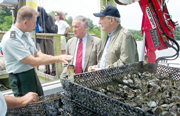
Bay Weekly Looking ahead to this November’s elections, do you worry that your party has a false sense of security in anticipating a kind of 1994-like tsunami against Republicans?
Paul Sarbanes No. I think Democrats are very mindful of the incredible money resources the Republicans have and the propaganda machine they’ve developed. The Republicans are willing to use virtually any tactic to prevail.
Democrats worry about what tactic the Republicans will use to try to draw people back, and we know the campaign will be hard fought. On the other hand, we feel strongly that this administration has headed the country in the wrong direction, run America off track. We believe that more Americans are coming to that perception.
Bay Weekly What’s next, Senator?
Paul Sarbanes Until January 3, 2007, I am still in the Senate. So we’re trying very hard to finish up some of things we’ve been working on, like the C&O Canal and the John Smith Water Trail.
Perhaps I’ll take the John Smith Water Trail around the Bay in one of his shallops.
We’ll see what the future holds. We’re going to go on living in Baltimore. People ask Where are you going to move to? We have a different understanding. We’re not going to move. We’re going to go on living where we always did.
Hopefully, we’ll be watching the next generation assume its responsibilities.







